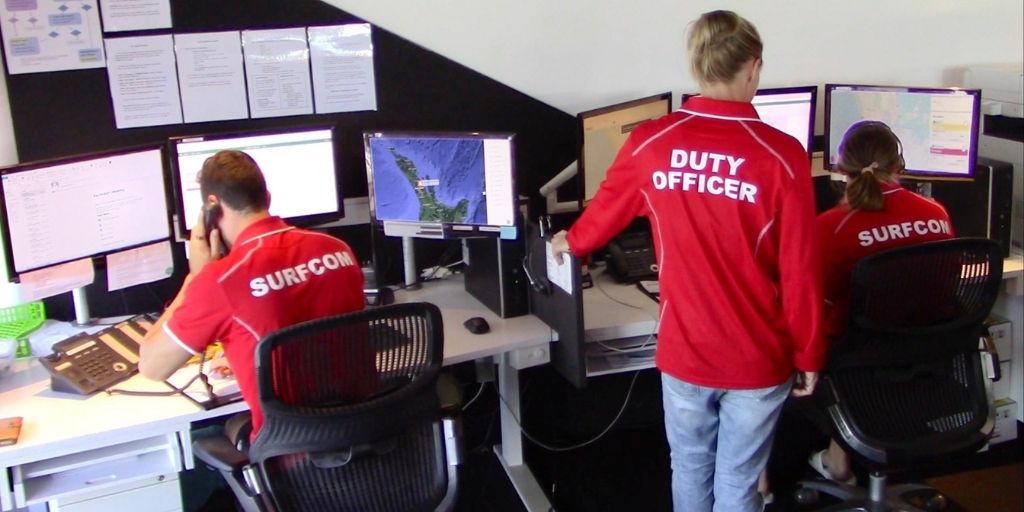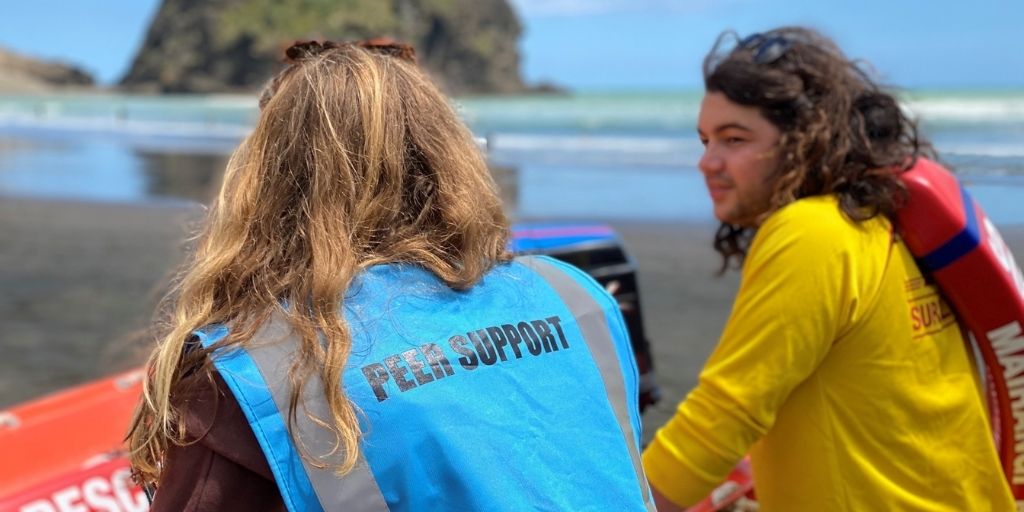Search and Rescue (SAR) Squads
Surf Life Saving Northern Region has 18 Search and Rescue (SAR) Squads based from Ahipara in the Far North all the way down to Raglan.
They are made up of around 275 senior lifeguards from each of our 18 clubs, who are available to be tasked 24/7 to incidents occurring at beaches or along the coastline in their local area.
Becoming a SAR Squad member:
Every club has a SAR Squad Coordinator who is responsible for organising regular training opportunities and ensuring all members meet SLSNZ’s minimum standards.
Please get in touch with your club’s SAR Coordinator if you wish to become involved.
Prerequisites:
- 18 years or older
- Annual induction by SAR squad coordinator
- Annual swim of 400m in under 9 mins
- Refreshed lifeguard awards (SLA, IRB, FA, etc)
Additional training opportunities:
- CIMS training
- Marine and Land Search Techniques
- SAR Leadership and Management courses
SurfCom
SurfCom is a 24/7 service that operates 365 days a year. Between Labour Weekend and Anzac Weekend it is manned by SurfCom Operators, and overnight and during the winter it is manned by Coastguard. It is the central hub that all other streams in Surf Life Saving report into.
SurfCom’s main role is to provide Search and Rescue Coordination for lifeguards and to act as a communications link between Surf Life Saving and other emergency services. Operators are responsible for tasking assets during an incident including SLS patrols, RWCs, Duty Officers, Emergency Callout Squads, Peer Supporters, or other emergency organisations. They monitor incident information coming through applications like MTXT, Active 911, the Surf Patrol App and the St John Mobile Data Terminal and are also responsible for maintaining a detailed communications log with all notable interactions.
SurfCom is also there to ensure Surf Life Saving procedures and minimum standards are being met and to be the professional face and voice of the organisation. Operators monitor patrol information coming through the Surf Patrol App and are trained to identify beaches that are breaching their POM or are likely to struggle (e.g. low number of lifeguards and high beach-user numbers) so these patrols can be provided extra support. Operators also handle initial media inquiries, interview Patrol Captains for press releases and package incident information to be put into their Daily Media Wraps.
As well as this, SurfCom monitors weather and water quality updates to ensure lifeguards and the beach-going public are kept safe and up to date about the best places to swim. Operators are also responsible for updating Auckland Council’s SafeSwim website to notify the public of hazards such as large swells, high winds, strong currents, jellyfish, sharks or sea lice at patrolled beaches.
Becoming a SurfCom Operator
For any inquiries please email: laura.beanland-stephens@surflifesaving.org.nz
Prerequisites:
- 18 years of age
- Must be able to commute to the Auckland Marine Rescue Center
- Surf Lifeguard Award or Patrol Support Award (refreshed)
- Club Endorsement
- First Aid Level 2 (refreshed)
- Marine VHF Certificate
- At least 2 seasons patrolling experience
Required skills and attributes are:
- Sound computer skills
- Calm under pressure
- Ability to multi-task
- Leadership & decision making qualities
- A background within Surf Lifesaving or understanding of Surf Lifesaving operations
Note: SLSNR reserves the right to accept members into the SurfCom program at their discretion
Duty Officers
Duty Officers are some of Northern Region’s most skilled lifeguards who lend their knowledge and experience to SurfCom and patrols during major incidents.
In the Marine Rescue Centre Operations Room the Alpha One works alongside SurfCom to make operational decisions. A good way to understand the relationship is to think of SurfCom as the mouth while the Duty Officer is the brain.
The Alpha One’s job is to look at the big picture and how Surf can best respond to an incident, while keeping member welfare at the forefront. They also liaise with other emergency services in the operations room on behalf of Surf and are the media spokesperson for operational matters.
During the summer, Delta One’s travel the region visiting volunteer clubs to build rapport and deliver training and operational updates. If an incident occurs Delta One’s can be tasked to support a patrol and be used as a sounding board for a Patrol Captain to bounce ideas off. If the Delta One is busy assisting a patrol or an incident is happening more than an hour from their location, SurfCom can reflex-task the Local Duty Officer network for a Delta Two to respond instead.
Delta One and Two’s are also useful for handling on-scene media inquiries, running debriefs and coordinating Peer Supporters who arrive on-scene. They are not there to get involved or take over control of an incident (except in extreme circumstances). The Duty Officer-Patrol Captain relationship is the same as the lead Duty Officer-SurfCom relationship – there to support and think of the big picture, but not to do the operational tasks unless absolutely necessary.
How to become a Duty Officer
Prerequisites:
- Surf Lifeguard Award
- 20 years old
- VHF Award
- First Aid Level 2
- CIMS 2/CIMS 3
- Patrol Leadership Experience*
- SLS Member
- Club Endorsement
- Accepted application from Regional Office
- Interview conducted by Regional Office
* This should be provided in application. E.g. Number of years as Patrol Captain at club, Senior or Advanced Lifeguard Award, Senior Lifeguard – Patrol Captain, Senior Lifeguard – Beach Management
Peer Support
With surf lifeguards responding to a greater number of serious incidents, peer support has become a major focus for the organisation.
There are five local peer support networks in Northern Region: Northland, Rodney, East Coast Auckland, West Coast Auckland and West Coast Waikato. Each of these networks has a team of trained Peer Supporters who can be tasked by SurfCom to attend debriefs and support lifeguards who’ve been involved in a traumatic or stressful incident e.g. a body recovery.
This may include providing initial support to members, assisting members to understand the impact of a stressful event, help in the organizing of formal psychological debriefing and educating members on stress reactions and natural coping mechanisms.
What is Peer Support about?
Peer Support is one option within a wider Membership Welfare Program that Surf Life Saving offers.
If you notice a friend or find yourself feeling or experiencing any of the following, please don’t hesitate to utilise one of the support options available.
- Feeling withdrawn or agitated
- Re-experiencing the event/bad dreams
- Feeling overly emotional
- Avoiding normal daily tasks/interactions
Becoming a Peer Supporter
SLSNR’s aim is to have at least one refreshed Peer Supporter available per club, this means that those clubs or local areas with fewer peer supporters will be prioritised.
Peer Supporters are endorsed by their Surf Club and undertake training before starting the role. At times Peer Supporters may be tasked to critical Incidents involving members who are experiencing a range of differing reactions to traumatic events.
It is important that all Peer Supporters have the necessary prerequisites and training to ensure proper and effective support can be provided.
Prerequisites for this role:
- 18 years of age
- Restricted Motor Vehicle License
- SLS Member
- Club endorsement
- Endorsement by local peer support network
- SLS understanding
- Good lifesaving knowledge
Note: SLSNR reserves the right to accept members into the Peer Support program at their discretion




